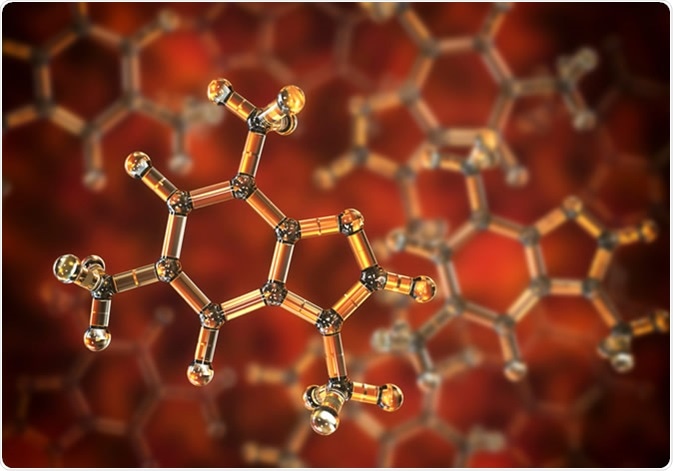Energy drinks are beverages that contain concentrated amounts of caffeine and other stimulants, including sugar, sweeteners, herbal supplements, vitamins, and taurine.
Energy drinks are marketed to improve energy, stamina, concentration, athletic performance, and even weight loss. But, there are limited studies to prove these claims. In fact, many side effects have been linked to these products, raising the question of whether these are safe to consume.
Though these drinks aren’t recommended for children, the number of youngsters drinking these beverages have increased over the years. In the age group between 11 and 18 years, boys consume more energy drinks than girls. Also, the most and least sedentary individuals are those who consume more of these beverages.

Caffeine molecule, 3d illustration. Caffeine is found in coffee, tea and energy drinks. Image Credit: Kateryna Kon / Shutterstock
Are energy drinks safe for kids?
Energy drinks contain high and unregulated amounts of caffeine. Normally, children and adolescents aged 12 to 18 years old, should not drink more than 100mg of caffeine a day, which is equivalent to a cup of coffee.
Energy drinks contain from about 50 mg to a whopping 500 mg of caffeine per serving. Increased caffeine levels consumed by children can cause a wide range of health consequences. Some of these adverse effects are serious enough to require seeking medical help.
Overall, the number of annual emergency department visits linked to energy drinks consumption increased from 10,068 in 2007 to a staggering 20,783 in 2011. Plus, there have been 34 deaths associated with energy drinks, warranting investigation on the safety of these beverages.
The US Centers for Disease Control and Prevention (CDC) reports that 1,145 adolescents between the ages of 12 and 17 went to the emergency room for emergencies linked to drinking energy drinks in 2007. In 2011, the number soared to 1,499.
What are the health effects of energy drinks on children?
Although healthy individuals can tolerate caffeine in moderation, heavy caffeine consumption, just like drinking energy drinks, has been linked to serious health effects like mania, seizures, stroke, and even sudden death.
Children and adolescents are at a higher risk of developing adverse effects from drinking energy drinks. These include palpitations, sleeping problems, headache, nausea, vomiting, diarrhea, and seizures. Children who drank more energy drinks were likely to use alcohol or have binge drinking, to smoke, or use other drugs, and display hyperactivity and other high-risk behavior.
This was also linked to self-destructive behavior, problems with behavioral regulation and other social skills, as well as poor lifestyle choices such as junk food consumption. In the long term, the high sugar content of these drinks causes dental caries, weight gain, obesity or overweight, and type 2 diabetes mellitus.
Large amounts of caffeine may cause severe heart and blood vessel problems like heart rhythm disturbances, increased heart rate and high blood pressure. In children, caffeine may negatively impact their still-developing cardiovascular and nervous systems.
In some cases, children and adolescents drink these beverages without control. They gulp several bottles a day, which can turn deadly. Caffeine intoxication, caffeine withdrawal symptoms, sleep disturbances, dehydration and anxiety are among the immediate dangers of unregulated energy drink consumption.
In fact, the American Heart Association (AHA) warns against children drinking these beverages. In a randomized study conducted by experts, they found that caffeinated energy drinks markedly prolong the QTc interval, a measurement made on an electrocardiogram used to assess some of the electrical properties of the heart, and also increase the central and brachial blood pressure. Prolonged QTc interval increases the likelihood of ventricular tachycardia, a type of fast heart rate that comes from an altered electrical activity in the heart.
Further Reading
Last Updated: Jun 17, 2019